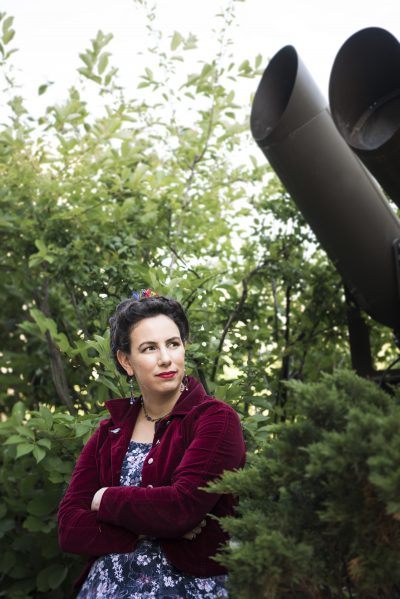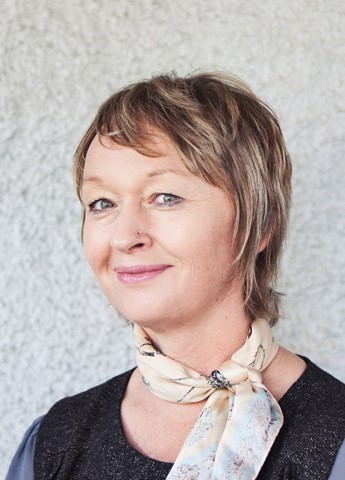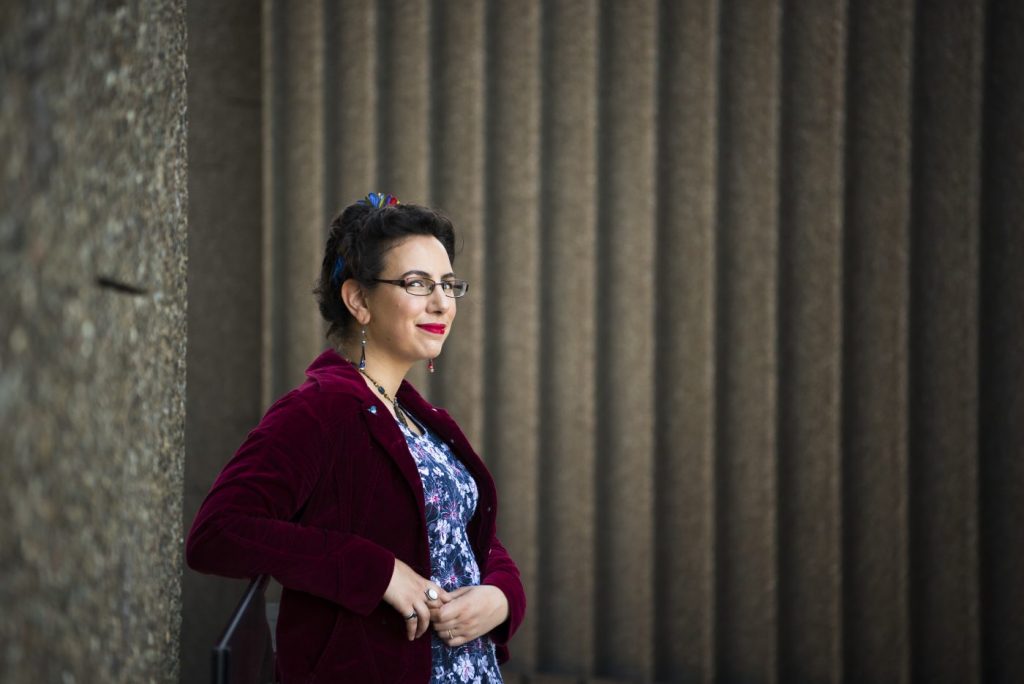A Balancing Act: Creativity and Course Work
So, you want to be a writer. But where do you start? What is the right path?
It’s a common enough dilemma: many students fall in love with the written word and dedicate themselves to a life of creative pursuit only to realize that they haven’t the slightest idea what academic trajectory will take them to their desired vocation or if a university degree is even useful at all.
The exact steps taken in pursuit of a creative-writing career are nebulous at best and non-existent at worst. However, while your aunt may tell you over Thanksgiving dinner that “a degree isn’t really necessary for a creative-writing career and, besides, you’ll never support yourself writing anyway,” two Carleton students who live, study, and write in Ottawa have proven these claims to be untrue.

Amal El-Mohtar is an award-winning poet, critic, instructor, and writer of speculative and science-fiction. She is currently a doctoral candidate in the English Department at Carleton University. Her newest release, a time-travelling, alternate-reality-traversing, epistolary-style novella co-written with story_intro_author Max Gladstone titled This Is How You Lose the Time War (2019), is already being optioned for a television adaptation and has won the Locus Award, the British Science Fiction Association’s Award, and the 55th annual SFWA Nebula Award.
Amal describes her prose as “sensory” and “lyrical.” She often finds herself orbiting themes such as transformation, translation, and women rescuing each other.
The following is an excerpt from Amal El-Mohtar’s Anabasis (2017):
I am a shape-shifter. Most people are. We change our shapes day on day, replace cells, grow muscles and fat, shed hair, grow it back lighter, darker. Some of us do it faster, is all—some of us have specialties. My specialty is mouths. My real mouth is full of sharp teeth and a sharper tongue, three languages coiled like snakes in my throat, scaly and silent. My real mouth is an armoury of words forged in the furnace of my chest, hot as a spitted sun. My real mouth is a storm, and my voice is thunder. To pass among you I wear a different mouth: full lips unparted, always smiling. I paint it pretty colours. It speaks only when spoken to, softly. To pass among you, it tells you stories: I am sweetness. I am sunshine. I am here to hold your hand through the horror of my name. My mouth is a coin, and I spend it. “Anabasis,” Tor.com, part of Nevertheless, She Persisted, March 2017 |
Deanna Young is a poet, editor, teacher, and current English Poet Laureate of Ottawa. In addition to these achievements, Deanna has just completed a Master’s degree in English Language and Literature at Carleton.
Her latest release, Reunion, is a collection of spare, mysterious poetry published in 2018. She describes the book as “a reunion of voices and ghosts from the culture of my youth in 1970s rural Southwestern Ontario. Ultimately, it’s an attempt at reunifying the self. I wanted to revive a world in order to subvert it.”

As Ottawa’s English Language Poet Laureate, her role includes working with students and story_intro_authors, reading at events, and speaking with the public about the value of poetry in their daily lives. Deanna’s writing finds her “preoccupied by the soul’s progress, by survival and healing, by transformation.”
While Amal and Deanna have different styles of writing and degree paths, they have both found that their experiences at Carleton have not only been academically rewarding, but valuable in fostering and shaping their creative-writing ambitions. Indeed, both women view each aspect of their careers as having inspired and informed the other.
In the process of attaining her Master’s degree, Deanna explains how her ability to choose the path best suited to her interests enriched her experience.
“I chose to follow the course-work stream in my degree, rather than the research paper or thesis stream, so that I might benefit from the expertise of as many professors as possible in following their assigned syllabi. Now everything from Old English poetry to Indigenous literatures to twentieth-century ghost stories is percolating in my imagination.”
The following is an excerpt from the title poem of Deanna Young’s fourth book, Reunion (Brick Books 2018):
In my right side, a tiny pain A vague, intermittent twinge. Doctors don’t have time for such delusions. There are too many others so close to death Best wait. |
Similarly, Amal has found herself weaving theories and ideas from her course work into her writing: “I love drawing on my academic background in my creative writing. I love to find places where those areas intersect in fruitful and generative ways. A class on settler colonialism introduced me to Patrick Wolfe’s idea that ‘invasion is a structure, not an event.’ It’s all over my writing now.”

For Amal and Deanna, the blend of academic and creative work is less about the struggle of keeping the two separate and balanced, but about the joy of discovering how they intertwine and inspire each other.
Upon discovering the poetic form, both writers were struck by its uniquely personal communicative power. Deanna was first acquainted with modern poetry by a high-school English teacher: “I felt I had discovered a language – of metaphor, imagery, symbolism and music – that could both enrich and elevate my life.”
Deanna explains that she once believed it was important to write poetry every day. However, in the face of jobs, moves, and family it was not always feasible and expecting otherwise just elicited guilt. She goes on to say that despite the stressors of life, “The poetry is always there, humming and waiting, then finally crying out for attention.”
Most recently, the process of writing Reunion was trance-like: “It was the most mystical experience I’ve had writing poems. I hope there will be more. After the initial spell wore off, the process was by turns arduous and absorbing, with rushes of inspiration and flashes of doubt. Then came the usual long, painstaking editing process.”
At a young age Amal became enamoured with writing and recalls a poem she wrote to the moon. In the eyes of her parents, this poem meant that Amal was following in the footsteps of her grandfather’s career. Amal remembers her grandfather’s legacy, both political and poetic, and its impact on her.
“No one ever said ‘he was a great man because he was a revolutionary and he suffered a great deal of torture in prison for his political beliefs’. It was always ‘he was a very good poet,’ but there was a sense that ‘poet’ contained everything else.”
As she continued to foster her creative ambitions, Amal eventually moved from poetry to short story and finally, to her most recent endeavour, the novella. For Amal, the collaborative nature of This Is How You Lose the Time War was exciting and helped her to grow in confidence as a science-fiction writer.
When asked for advice to pass along, Amal hopes that in today’s social media dominated environment writers will be able to “have silence in their own minds” and follow their own instincts. She also postulates that the most important aspect of growing as a writer is to finish and learn from the work that one starts, regardless of how it matches up to expectations.
On the same topic, Deanna urges aspiring writers to tell their own stories confidently and courageously rather than following fashionable trends.
Regardless of when writers discover their love of the craft, or how they choose to pursue their degrees, passion and self-confidence are invaluable. But the elements necessary for becoming a well-rounded writer can rarely be found in the solitude of one’s mind.
Inspiration must come from somewhere and where better to find inspiration than among passionate and like-minded individuals? For Deanna and Amal, Carleton proved that academia is not the ends of creativity but rather an opportunity to learn from peers, instructors, and ultimately, oneself.